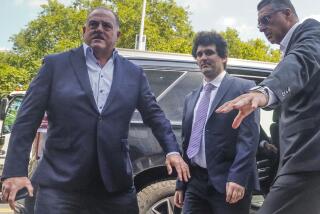Closing Statement by Prosecution Questions Bingham’s Truthfulness
- Share via
SAN RAFAEL, Calif. — Closing his murder case against one-time fugitive Stephen Bingham, a Marin County prosecutor told jurors Monday that Bingham would not have fled the country for 13 years if he was innocent of sparking a 1971 prison uprising that left six men dead.
In his closing statement, Assistant Dist. Atty. Terrence Boren reviewed testimony and evidence in the trial, which began April 8, seeking to persuade the jury that Bingham slipped inmate George Jackson a pistol, two rounds of ammunition and an Afro wig inside a tape recorder, when Bingham visited the prison revolutionary at San Quentin on Aug. 21, 1971.
The government charges that Jackson hid the gun under the wig, when he was to return to his cell. When the weapon was discovered, it touched off the bloodshed.
Bingham disappeared the day of the violence and remained a fugitive until he surrendered in San Francisco in 1984. He testified earlier this month that he spent most his time underground in Paris under an assumed identity. He said he also spent time in Czechoslovakia and Yugoslavia.
Killed in Melee
Bingham, a lawyer and member of a prominent Connecticut family, is charged with two counts of murder and one count of conspiracy. Three prison guards and three inmates, including Jackson, were killed in the melee. Bingham is charged with the murder of two of the guards, Frank DeLeon and Jere Graham, who were killed with the gun he allegedly smuggled into the prison.
The prosecution contends that Bingham, 44, conspired with Jackson in the planned escape and by supplying the gun, Bingham “is liable not only for the conspiracy but for the consequences,” Boren said.
“The single issue in this case is whether the defendant passed the gun, the clips of ammunition and the wig to George Jackson during the visit,” he said. “If you find that he did not, then he is not guilty of anything.”
Boren told the jury that out of 10 men who testified during the trial, Bingham was the only one with a pattern of lying, thus making his testimony less believable than the others.
Boren showed the jury a list of 10 men who testified.
“Only 1 of 10 went into hiding that night,” Boren said. “Only one surreptitiously left the Bay Area within two days of Aug. 21.”
False Name
Boren continued, saying only one changed his appearance, destroyed his identification, lied to get a passport under a false name, found a haven in Czechoslovakia and Yugoslavia and spent the next 13 years lying about who he was and where he was from.
“Only one,” Boren said, circling Bingham’s name on the list of 10 witnesses and drawing arrows pointing to it.
Boren also contrasted Bingham’s testimony with that of San Quentin guard Kenneth McCray, who feigned death after his throat was cut by inmates and the bodies of three fellow guards were thrown on top of him in a cell during the uprising.
McCray testified, Boren said, “because he’s not afraid of the truth.”
“He (McCray) never avoided (testifying), he never ran away, he never hid and he never lied,” Boren said.
More to Read
Sign up for Essential California
The most important California stories and recommendations in your inbox every morning.
You may occasionally receive promotional content from the Los Angeles Times.












